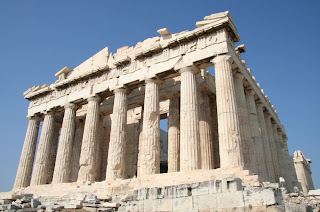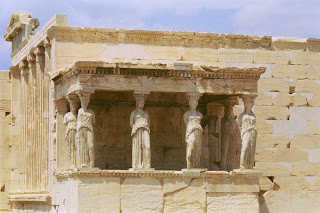About Greece - One of the great Ancient Civilization of the World !
Background
For many years archeologists around the world have been fascinated with the truth behind the alluring stories of 'Iliad' and 'Odyssey' written by Homer, the great poet of Greece. Around the end of the 19th century Homer's story did not only reside in his poetic verses, the truth of one of the great civilizations of the ancient |
| About Greece and Culture |
Geographical Location and Time Frame
Greece is surrounded by the Adriatic Sea, the Mediterranean and the Aegean Sea. There are two terms that go complimentary with the Greek civilization. One is 'Hellenic' and the other is 'Hellenistic'. The Hellenic culture flourished in the capital city of Athens in the Greek peninsula. On the other hand the Hellenistic culture flourished with the amalgamation of Greek and the Non- Greek cultures in Alexandria in Egypt under the rule of Greek emperor Alexander the Great.Sparta, the Military State
Sparta is one of the many city states that emerged in ancient Greece. This city state was situated in the south of Greece in the area known as Peloponnese. Sparta was totally different and exceptional from other city states. A close observation into the lives of the Spartans reveals that they were influenced by military actions and war tactics. Their focus was to increase the military resources of the city rather than to improve the quality of life for the citizens. In 800 B.C after a long battle, the Dorian soldiers were able to take over Sparta. The local people who were defeated in the war were land slaves and were called 'helots'. They used to instigate revolution whenever they got chance. The defeated inhabitants who were forced to become land slaves were large in number. So to maintain order and to sustain their rule, the rulers of Sparta had only one thing on their minds which was to suppress revolution. The Spartans' lives were dedicated to save Sparta. The Spartan society emerged from the necessity of war. And the rulers of Sparta were dedicated to prepare its citizens for war and to lead the army. For their war-driven attitude the Spartans were left behind in social, political, economic and cultural advancement.Athens, the Democratic State
In the ancient Greece the first democratic state to emerge was Athens. But in the earlier days Athens was a monarchy. In the 7th century B.C the monarchy declined and a form of aristocracy emerged. The power came in the hands of a few Elites. They only looked at their own interest in the name of ruling the state. As a |
| Greek Culture and Civilization |
Contribution of Greece to Civilization
Although for the geographical location the Greek city states were separated from each other, their culture was the same. They believed that they inherited the same cultural trend in spite of the political difference. Their language, religion, literature and game all bound the whole Greece together. Athens played a dominating role in defining the culture of Greece. They gave the name of this culture Hellenic Culture.Education
The Greek scholars had much idea about education. They gave importance to moral and spiritual education. Some of them thought that the responsibility of ruling the state should be in the hands of educated nations. The education system should reflect the philosophy and the goal of the government. The main purpose of education is to teach discipline and obedience. Greek boys at the age of seven start going to schools. The boys from the rich family were educated formally until they were 18 years of age. The boys ofthe farmers and the craftsmen were educated in the primary level. The slaves were prohibited from going to schools. The girls were not allowed to study in any institution.
Literature
The contribution of ancient Greece to literature is a great gift to the human race. Homer's famous epic 'Iliad' and 'Odyssey' is still famous specimen of the great works of literature. They achieved the highest success in literature especially in the genre of drama. The Greeks were particularly experts in tragedy. Aeschylus is known to all as the father of tragedy. His famous drama was Prometheus Bound. However the greatest dramatist in Greek civilization was Sophocles. He has written over a hundred dramas. Among his famous plays the most popular ones are King Oedipus, Antigone and Electra. Another famous dramatist was Euripides. Aristophanes, a comic playwright, defines and shapes the idea of comedy and satire. The Greeks also showed a lot of expertise in writing chronicles. Chronicles and history writing started during this time. Herodotus was known as the father of History. The first history book of Herodotus was written on the war between Persia and Greece. Thucydides was the father and founder of scientific history. His famous book was The Peloponnesian War.Religion
The Greeks had twelve Gods and Goddesses. They worshipped natural forces and also famous warriors. Zeus was the father of all other Gods. Apollo was the sun God, Poseidon was the sea God. Athena was the Goddess of the knowledge. Among the twelve Gods and Goddesses these four were the principle ones. The priests looked over the religious matters by order of the government. People from different city-states gathered together and worshipped the sun God Apollo in his famous temple of Delphi in Delos.Philosophy
Greece made a significant contribution to the field of philosophy. Philosophy emerged as the Greeks searched for answers to the questions about the origin of the universe, how the change is taking place in the world etc. Thales was one of the earlier philosophers. He was the first to explain the reason for eclipse of the sun. After him didactic philosophy was introduced in Greece. This sort of philosophers was known as the Sophists. They believed that there was no absolute truth in this world. Pericles was a follower of this branch of philosophers. Socrates was the most famous among these philosophers. The main goal of his philosophy was to create an ideal state and an ideal citizen. His teaching included speaking out against tyranny. Plato, the famous student of Socrates took Greek philosophy to a peak of popularity. Aristotle, Plato's student was also a very famous philosopher of the time.Science
The Greeks first started practising science in 600 B.C. The Greek scientists were among the first to draw the map of the world. They were the first to prove that the world is one of the planets in the universe and it is revolving in its own orbit. The Greek astrologers were also able to explain the reason behind the sun and moon eclipse. They were also the ones to first identify that the moon does not have any light of its own and that the lightening and the thunder was not a result of Zeus's anger but it was a natural cause and effect. Euclid, a geometrician was an expert in physics. The famous mathematicians Pythagoras, physician Hippocrates were also the gifts of this civilization. Architecture and Sculpture:Greek civilization was well developed in architecture and sculpting. The evidence of the excellence of the Greek art can be found in the carvings and designs on the earthen wares. There is much evidence spread around Greece of the specimen of Greek architecture. They built large palaces on tall pillars and the pillars had beautiful, detailed sculpting on them. One of the greatest examples of the excellence of Greek architecture is the temple of Athena the Parthenon.In Athens one can still find the beautiful works of Greek architecture in the ruins of acropolis. The Greek sculpture has given the birth to a golden era in the world of art. The famous sculptors of the time were, Myron, Phidias and Praxiteles.Games
The Greeks paid special attention to the games of the children. They had their initiations in games in the schools. The Greeks had tremendous interest in physical training and sports. In different festivals the Greeks arranged sports competitions. Among them the most popular competition was the one they did in Honor of Zeus. The most popular sports men in Greece took part in were the Olympics. In the Olympics they organized sports like race, wrestling, throwing spear, boxing etc. The winners were congratulated with garland of olive branch and leaves. The Olympics was held after every four years. It was a very prestigious competition and sportsmen coming from other city states would come to Athens to take part in it. Olympics were renowned for creating a brotherly bond between the participants coming from other city states.Map - Greece
View Larger Map



0 comments:
Post a Comment